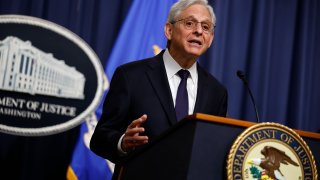
- The Department of Justice said it has charged 78 people with $2.5 billion in health-care fraud as part of a coordinated crackdown.
- The DOJ said the defendants allegedly defrauded programs used to take care of elderly and disabled people, and in some cases used the ill-gotten money to buy exotic cars, jewelry and yachts.
- Among those charged are 11 defendants accused of submitting $2 billion in fraudulent claims through telemedicine, as well as 10 defendants charged in connection with fraudulent prescription drug claims.
The Department of Justice announced Wednesday that it has recently charged 78 people with $2.5 billion in separate health-care fraud and opioid abuse schemes.
The defendants allegedly defrauded programs used to take care of elderly and disabled people, and in some cases used the ill-gotten money to buy exotic cars, jewelry and yachts, the DOJ said.
Among those charged are 11 defendants accused of submitting $2 billion in fraudulent claims through telemedicine, as well as 10 defendants charged in connection with fraudulent prescription drug claims.
Feeling out of the loop? We'll catch you up on the Chicago news you need to know. Sign up for the weekly Chicago Catch-Up newsletter here.
In all, prosecutors filed charges against people in 16 states in cases that were lodged or unsealed in the past two weeks as part of the coordinated crackdown.
The defendants include "physicians and other licensed medical professionals who lined their own pockets, including doctors who allegedly put their patients at risk by illegally providing them with opioids they did not need," the DOJ said in a press release.
Attorney General Merrick Garland in a statement said, "These enforcement actions, including against one of the largest health care fraud schemes ever prosecuted by the Justice Department, represent our intensified efforts to combat fraud and prosecute the individuals who profit from it."
Money Report
In the scheme cited by Garland, executives of supposed software and services companies submitted $1.9 billion in fraudulent claims to Medicare for items that were not eligible for reimbursement, according to the DOJ.
The defendants in that case are Brett Blackman and Gregory Schreck of Johnson County, Kansas, and Gary Cox of Maricopa County, Arizona, who allegedly used mass telemarketing operations to sell the elderly and disabled expensive and unnecessary medical equipment and prescriptions, according to an indictment in U.S. District Court for the Southern District of Florida.
The trio allegedly operated a software platform called DMERx that generated fake and fraudulent doctors' orders in exchange for illegal kickbacks and bribes.
Cox was CEO of the company that originally operated the software behind the fraud scheme. He subsequently sold the platform to a company where Black was CEO and Schreck was vice president of business development.
The defendants allegedly received payments for referring fraudulent doctors' orders and prescriptions to pharmacies, suppliers and telemarketers, according to the indictment. The orders and prescriptions claimed the doctors had actually examined or treated the patients when in reality the physicians were paid to sign the documents by supposed telemedicine companies, the indictment alleges.
In many instances, the doctors had just a brief phone call with the patients or no interaction at all, according to the indictment. In an effort to conceal the scheme, the defendants allegedly removed references to telemedicine in the orders.
In a separate case, the DOJ also indicted Steven Diamantstein, owner of Scripts Wholesale Inc., for a $150 million fraud scheme involving HIV medication.
Diamantstein, who lives in Brooklyn, New York, allegedly purchased HIV drugs at a steep discount from people who illegally obtained the pills by paying patients cash and repackaging them for sale.
Diamentstein then falsely claimed his company had obtained the drugs through legal channels, according to an indictment in U.S. District Court in New Jersey.
The DOJ also charged 24 doctors and medical professionals in cases related to $150 million in false billings involving the illegal distribution of opioids and lab testing fraud.






